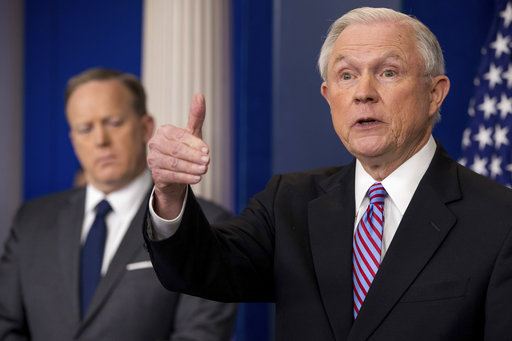A spokesman for Attorney General Jeff Sessions late Thursday pushed back on several aspects of James Comey’s Senate testimony after the former FBI director raised new questions about Sessions’ actions before and after he recused himself from the federal investigation of Russia’s interference in the U.S. election.
Comey’s testimony touched on Sessions at several points. He hinted that the FBI was aware of information that led the bureau to believe Sessions would recuse himself from the Russia probe weeks before he actually did so, and reportedly told senators in a subsequent closed session that Sessions may have met with the Russian ambassador to the U.S. on a third occasion that the attorney general had not disclosed.
The former FBI director also described Sessions’ reaction when Trump sought to speak with Comey alone after a Feb. 14 meeting in the Oval Office, in which Comey says Trump pressured him to drop a probe into Michael Flynn, the ousted national security adviser. Comey testified that when the President asked everyone to leave the room so he could speak to the then-FBI director alone, he got the impression Sessions knew what Trump might say to him, and that Sessions did not verbally react when Comey later implored that he could not be left alone with Trump again.
Sessions spokesman Ian Prior pushed back on Comey’s allusions to the rationale behind Sessions’ recusal and his description of how Sessions behaved during and after the Feb. 14 meeting.
Prior said that the attorney general recused himself from the Russia probe for the sole reason that he had been a surrogate for the Trump campaign.
“Given Attorney General Sessions’ participation in President Trump’s campaign, it was for that reason, and that reason alone, the Attorney General made the decision on March 2, 2017 to recuse himself from any existing or future investigations of any matters related in any way to the campaigns for President of the United States,” Prior said in a statement.
During his testimony, Comey explained why he and other FBI staffers expected Sessions to recuse himself from matters related to the Russia investigation weeks before the attorney general stepped aside from the probe.
“Our judgment, as I recall, was that he was very close to and inevitably going to recuse himself for a variety of reasons,” Comey said Thursday. “We also were aware of facts that I can’t discuss in an open setting, that would make his continued engagement in a Russia-related investigation problematic and so we were—we were convinced and in fact, I think we had already heard that the career people [at the Justice Department] were recommending that he recuse himself, that he was not going to be in contact with Russia related matters much longer.”
Sessions recused himself from the Russia probe after it was revealed that he failed to disclose two meetings with Kislyak. But Comey told senators in a closed session after his public testimony that Sessions may have met with Russian Ambassador Sergey Kislyak a third time at the Mayflower Hotel in Washington, D.C. in April 2016, according to reports from CNN and NBC News.
The former FBI director also testified that he did not recall seeing any internal guidance from Sessions describing the parameters of his recusal. Prior asserted in his statement that Sessions did send an email to Comey and others about his recusal. He also said that since Sessions initially met with ethics officials to discuss a potential recusal, the attorney general “has not been briefed on or participated in any investigation within the scope of his recusal.”
Sessions’ spokesman also disputed Comey’s description of the encounter the two had after the Feb. 14 Oval Office meeting as well.
In Comey’s telling, he did not tell Sessions that Trump had asked him to drop the Flynn investigation, but he told Sessions that he could not be left alone with Trump again. Comey testified that Sessions did not offer a verbal reply, but that his body language indicated “what am I gonna do?”
Prior contested that account.
“The Attorney General was not silent; he responded to this comment by saying that the FBI and Department of Justice needed to be careful about following appropriate policies regarding contacts with the White House,” he said in the statement.







I trust Dixie Pixie almost as much as I trust Hair Furor.
So it was a coincidence that he recused after his meetings with Kislyak hit the papers? I think he needs a new spokesman.
Interesting that Li’l Jefferson Beauregard Sessions III fails to mention–***-again***—that third meeting he had with Kislyak----in attacking Comey’s fact-filled and truthful testimony.
Well, did you go to the President after the meeting and discuss it with him? There is zero indication you did.
Sessions himself is one of the parties under investigation. Let’s see him testify. And let’s see the Prez testify.
Comey displayed total integrity and was a total professional. Even when he was unsure of something, he stated as such, he did not BS. This POS in the WH fired a great guy, and he needs to pay dearly for it. He will, but it will take time.
Pull the other one; it has bells on it. I do hope we are seeing the beginning of the end of Sessions’ term at DOJ. He’s as dirty as Jared and his master.